A Guide to Implementing AI in Customer Experience
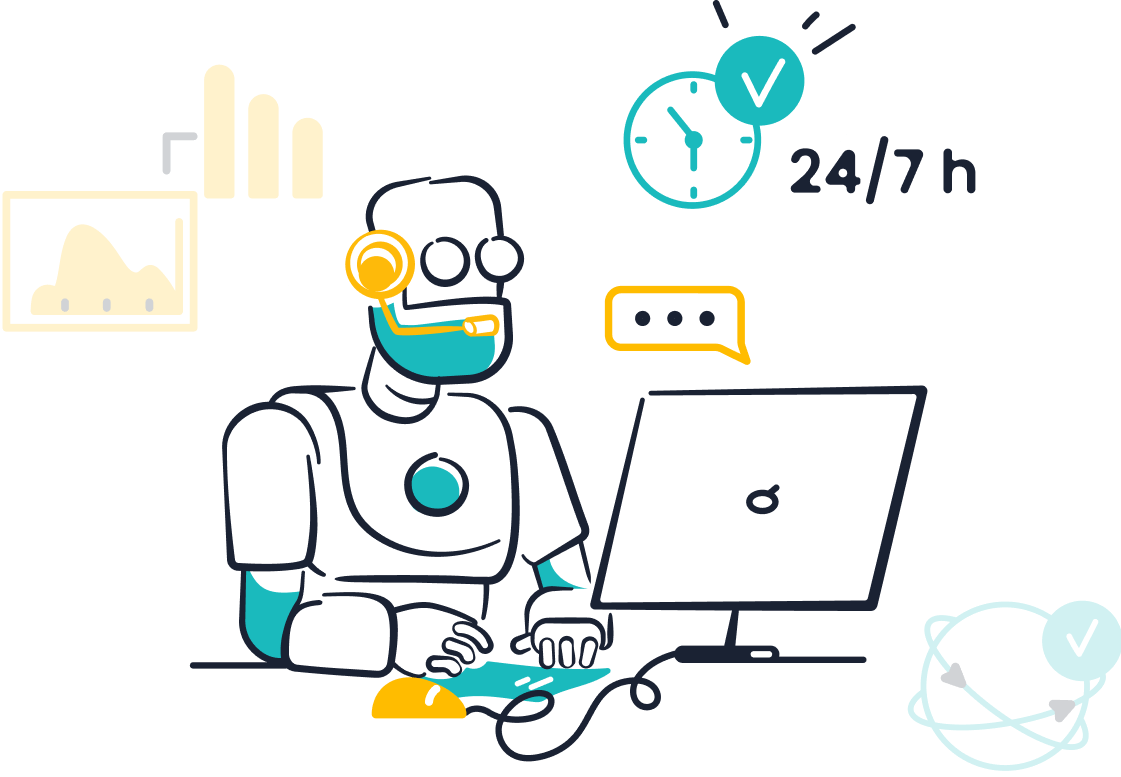
AI has revolutionized how businesses approach customer experience (CX). You can now leverage AI in CX to enhance interactions, boost satisfaction, and drive business growth. Studies show that AI tools resolve 88% of customer queries, far surpassing human agents' 40%. Additionally, companies using AI for customer experience report a 20% increase in satisfaction rates. Tools like Sobot’s AI solutions enable businesses to provide seamless, personalized, and efficient support. As 73% of customers prefer AI in CX for service interactions, adopting AI is no longer optional but essential for staying competitive in today’s dynamic market.
What is AI in CX and Why Does It Matter?
Defining AI in customer experience
AI in CX refers to the use of artificial intelligence technologies to enhance how businesses interact with their customers. It includes tools like chatbots, predictive analytics, and virtual assistants that automate and improve customer service processes. AI analyzes customer data to understand preferences, behaviors, and needs, enabling businesses to deliver personalized experiences. For example, Sephora’s “Virtual Artist” chatbot lets customers try makeup virtually, offering tailored recommendations that boost satisfaction. Similarly, Allstate’s AI virtual agent “Amelia” reduces talk times by efficiently resolving insurance-related queries. These applications demonstrate how AI transforms customer interactions into seamless, engaging experiences.
Key benefits of AI for customer service and support
AI offers several advantages for customer service. It accelerates problem resolution, with businesses seeing a 20% improvement in customer satisfaction due to faster service. AI tools also boost agent productivity by 14%, as they handle routine tasks, allowing human agents to focus on complex issues. Proactive customer management is another benefit. AI suggests actions based on customer data, improving engagement and reducing issue escalation. Companies like Newzip have experienced a 60% increase in engagement through AI-powered personalization. By streamlining processes and enhancing interactions, AI drives better business outcomes and fosters deeper customer relationships.
Common AI tools transforming customer experience, including Sobot's Chatbot

AI tools are reshaping customer experience across industries. Chatbots, predictive analytics, and virtual assistants are among the most impactful technologies. Sobot’s AI Chatbot stands out as a powerful solution for automating customer interactions. It operates 24/7, solving regular queries autonomously and assisting agents, which improves productivity by 70%. Its multilingual capabilities and no-coding-required setup make it accessible for businesses of all sizes. The chatbot also boosts conversions by 20% through proactive messaging and real-time intent assistance. Companies like OPPO have leveraged Sobot’s Chatbot to achieve an 83% resolution rate and a 57% increase in repurchase rates. These tools not only enhance efficiency but also elevate customer satisfaction, making AI indispensable for modern CX strategies.
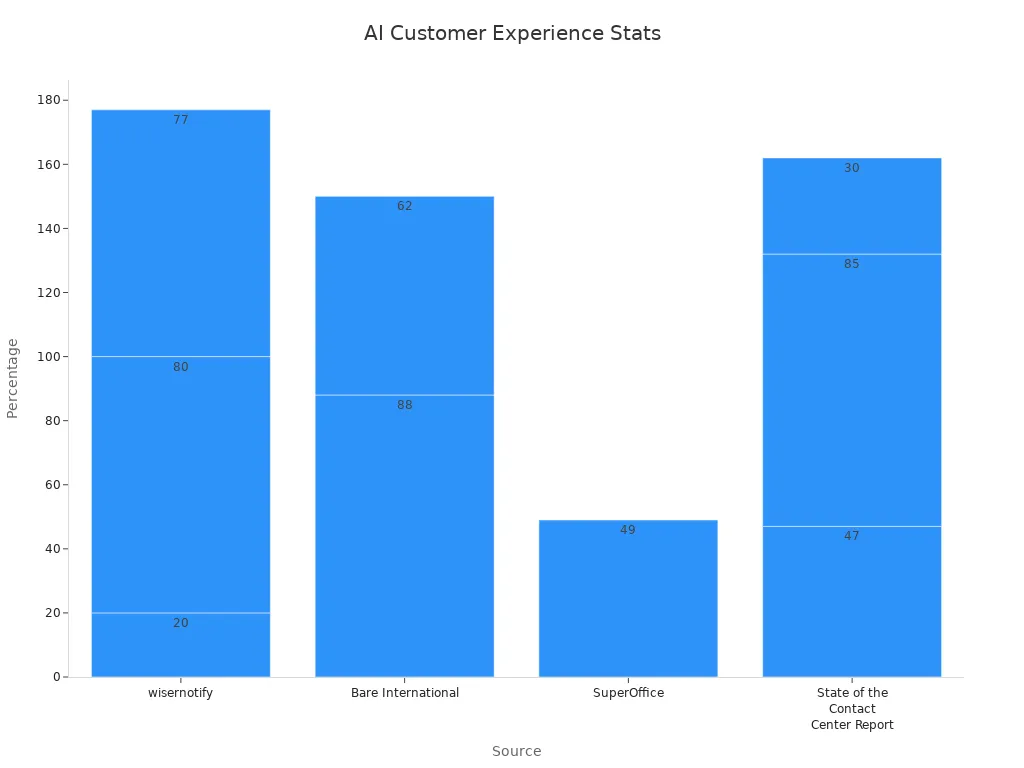
Real-World Success Stories of AI for Customer Experience

How leading brands like OPPO leverage AI to enhance customer interactions
AI has become a game-changer for brands aiming to elevate their customer experience. OPPO, a global leader in smart devices, provides a compelling example of how AI transforms customer interactions. By integrating Sobot's AI Chatbot and ticketing system, OPPO streamlined its customer service operations. The chatbot efficiently handled repetitive queries, allowing human agents to focus on complex issues. This human-machine collaboration resulted in an impressive 83% chatbot resolution rate and a 94% positive feedback score.
Additionally, Sobot helped OPPO optimize its knowledge base, reducing maintenance efforts by 90%. This improvement ensured customers received accurate and timely responses, even during peak shopping periods. The integration of global customer channels further enhanced data accessibility, enabling seamless service delivery. These advancements contributed to a 57% increase in OPPO's repurchase rate, showcasing the transformative power of AI in CX.
Case studies showcasing AI-driven customer support success
Many companies have achieved remarkable results by adopting AI for customer experience. The following table highlights some notable examples:
| Company | AI Implementation Description | Results |
|---|---|---|
| Google Fi | Uses chatbots for customer service, resolving issues and billing inquiries. | Increased efficiency and positive customer feedback for quick responses. |
| H&M | Utilizes virtual assistants to help customers find clothing and answer style questions. | Improved customer satisfaction and increased sales during shopping seasons. |
| Airbnb | Employs a multilingual chatbot for booking inquiries and support requests. | Expanded customer base and enhanced trust through accurate multilingual support. |
| Netflix | Implements generative AI for personalized content recommendations. | Higher customer satisfaction reflected in longer subscription retention and engagement. |
| Suitor | Automated 85% of customer service queries with a retail chatbot. | Reduced average response time from 3 minutes to 15 seconds for live chat. |
| Procosmet | Implemented live chat with automated chatbots to enhance customer experience. | Increased sales by 23% and improved customer rating from 3.8 to 4.7/5 based on feedback. |
These examples demonstrate how AI enhances customer satisfaction, boosts efficiency, and drives revenue growth. For instance, Suitor's chatbot reduced response times significantly, while Procosmet saw a 23% sales increase after implementing AI-powered live chat.
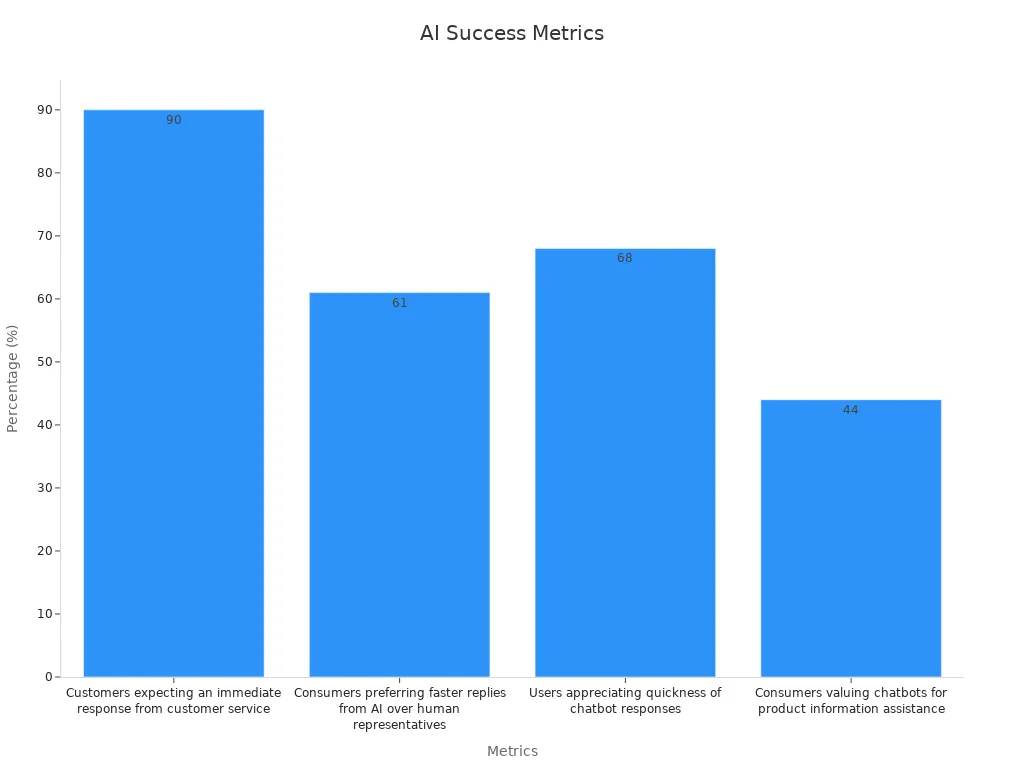
Lessons learned from successful AI implementations
Implementing AI in customer experience requires careful planning and execution. Companies that have succeeded share some common strategies:
- Start small: Begin with pilot projects to test assumptions and gather feedback before scaling. For example, a telecom company piloted an AI chatbot and saw a 20% increase in customer satisfaction within six months.
- Define clear goals: Identify specific problems AI should solve to avoid unnecessary complexity. A financial services company reduced false positives in fraud detection by 30% by focusing on a targeted subset of transactions.
- Establish feedback loops: Continuously collect data on system performance and user satisfaction to refine algorithms and processes.
- Measure impact: Track metrics like customer retention rates, revenue growth, and satisfaction scores to evaluate AI's effectiveness. Establishing a 30-day baseline before implementation can help measure improvements accurately.
By following these lessons, you can maximize the benefits of AI while minimizing risks. Sobot's AI solutions, for instance, provide businesses with tools to automate customer interactions, improve efficiency, and enhance satisfaction, making them a valuable partner in your AI journey.
Actionable Strategies for Implementing AI in CX
Identifying customer pain points and aligning AI solutions
Understanding your customers' pain points is the first step in implementing AI effectively. By analyzing feedback, complaints, and interaction data, you can pinpoint areas where AI can make the most impact. For example, companies integrating AI into Voice of the Customer (VoC) programs have seen a 30% improvement in responding to customer feedback. Similarly, businesses using AI for customer journey mapping report a 20% increase in customer satisfaction.
AI-driven analytics can help predict customer behavior and identify trends. Tools like sentiment analysis and automation simplify data collection, providing actionable insights. Proactively addressing customer needs optimizes the customer journey and reduces effort scores by 15%. For instance, Sobot’s AI solutions enable businesses to unify customer data across channels, ensuring seamless interactions and personalized experiences.
| Evidence Description | Improvement Metrics |
|---|---|
| Companies integrating AI into VoC programs | 30% improvement |
| Companies using AI for customer journey mapping | 20% improvement |
| Businesses enhancing customer journey with AI | 15% reduction |
Leveraging AI-powered chatbots like Sobot's Chatbot for 24/7 support
AI-powered chatbots are transforming customer service by providing round-the-clock support. Sobot’s AI Chatbot is a prime example, offering multilingual capabilities and a no-coding-required setup. It autonomously handles routine queries, reducing inbound volume by 20% and improving problem resolution rates to 85%. This efficiency allows human agents to focus on complex issues, enhancing overall customer satisfaction.
The chatbot’s self-service capability stands at 22.2%, empowering customers to resolve issues independently. Its proactive messaging and real-time intent assistance boost customer happiness rates to an impressive 99%. Businesses using AI-driven chatbots like Sobot’s have reported a 96% positive feedback rate and a 97% CSAT score. These metrics highlight the chatbot’s ability to deliver consistent, high-quality support across channels.
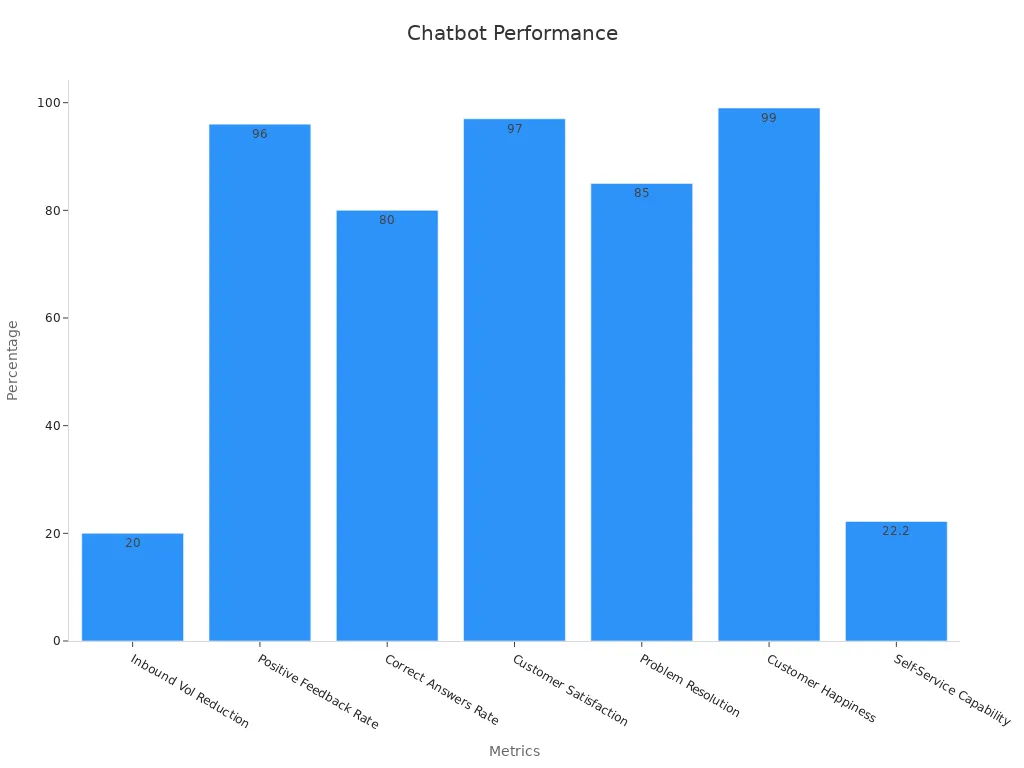
Using predictive analytics to anticipate customer needs
Predictive analytics enables you to anticipate customer needs by analyzing historical data and identifying patterns. For instance, Caesars Entertainment uses predictive analytics to forecast staffing needs based on expected customer influx. Similarly, demand forecasting tools analyze past sales data to optimize inventory and marketing strategies.
Platforms leveraging predictive analytics can also identify at-risk customers, allowing you to implement targeted retention strategies. Behavioral targeting helps forecast sales trends, while customer segmentation enables personalized marketing campaigns. AI models even suggest next-best-action recommendations based on real-time interactions, ensuring your customers receive timely and relevant solutions.
A study by McKinsey reveals that companies investing in AI see revenue increases of up to 15% and sales ROI improvements of up to 20%. Sobot’s AI solutions integrate predictive analytics to help businesses anticipate customer needs, reduce churn, and enhance satisfaction. By adopting these tools, you can stay ahead of customer expectations and drive growth.
Personalizing customer experiences with AI-driven recommendations.
AI has transformed how businesses deliver personalized customer experiences. By analyzing data such as purchase history, browsing behavior, and preferences, AI enables businesses to tailor recommendations that resonate with individual customers. For instance, Amazon uses AI to suggest products based on shopping habits, while Netflix recommends movies and shows aligned with viewing patterns. Spotify curates playlists like "Discover Weekly" by understanding user preferences, creating a unique and engaging experience for each listener.
Personalization extends beyond recommendations. AI-powered tools can customize email subject lines, increasing open rates by 26%. Segmented campaigns driven by AI have shown a staggering 760% increase in email revenue. These strategies not only enhance customer satisfaction but also foster loyalty and trust. Brands leveraging AI for personalization report higher engagement and retention rates, as customers feel valued and understood.
Sobot’s AI solutions, including its Chatbot, play a pivotal role in personalizing customer interactions. The Chatbot uses real-time intent analysis to provide tailored responses, ensuring customers receive relevant information instantly. Its multilingual capabilities further enhance the experience by communicating in the customer’s preferred language. By integrating AI-driven recommendations, businesses can elevate their customer experience, driving satisfaction and long-term loyalty.
Tip: Start small when implementing AI for personalization. Focus on one area, such as product recommendations or email campaigns, and expand as you see results.
Training teams to integrate AI tools seamlessly into workflows.
Effective AI implementation requires well-trained teams. Training ensures your staff understands how to use AI tools effectively, maximizing their potential. Continuous monitoring and feedback loops are essential for successful training. Practical applications of AI skills should form the core of your training programs, allowing employees to gain hands-on experience.
AI itself can enhance training processes. It provides detailed analytics on learner performance, identifying strengths and areas needing improvement. This data enables targeted training sessions, ensuring employees acquire the skills they need. Regular assessments linked to performance indicators help measure the impact of training, ensuring alignment with business goals.
Sobot supports businesses in training their teams to integrate AI tools like its Chatbot seamlessly. The Chatbot’s intuitive interface requires no coding, making it easy for employees to adopt. Sobot also offers training resources and 24/7 support to guide teams through the integration process. By equipping your staff with the right knowledge and tools, you can ensure a smooth transition to AI-powered workflows, enhancing efficiency and customer satisfaction.
Note: Encourage your team to embrace AI as a tool to assist, not replace, their roles. This mindset fosters collaboration and innovation.
The Future of AI in Customer Experience
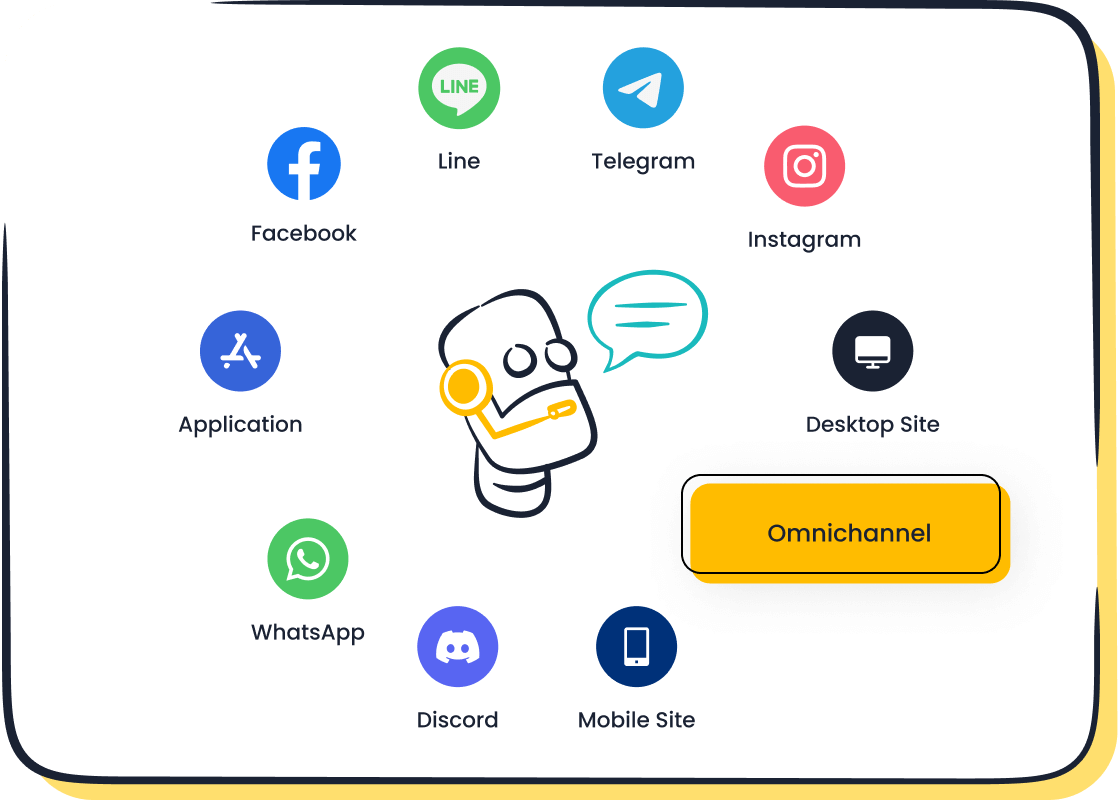
Emerging trends in AI for customer service, such as generative AI and voice recognition
AI continues to evolve, introducing groundbreaking technologies that redefine customer service. Generative AI is transforming industries by streamlining processes and enhancing user experiences. For example, businesses use generative AI to create personalized content, automate workflows, and improve customer interactions. Voice recognition technologies are also gaining traction, especially in sectors like healthcare, education, and customer service. These tools allow customers to interact hands-free, making tasks more intuitive and efficient.
The demand for voice-enabled devices and virtual assistants is driving investments in AI voice technologies. Integration with 5G and edge computing enables real-time audio generation, enhancing customer experiences across industries. However, challenges like trust issues and misuse of generative AI highlight the need for ethical guidelines and transparency. As AI adoption grows, explainable AI systems will play a crucial role in fostering trust and ensuring safe implementation.
The role of AI in creating omnichannel customer experiences
AI is revolutionizing omnichannel customer experiences by enhancing personalization, consistency, and flexibility. Businesses can now unify customer data across channels, ensuring seamless interactions. For instance, AI-backed sentiment analysis tools provide insights into customer preferences, enabling tailored recommendations. Studies show that hyper-personalization can generate up to 40% more revenue for retailers, while 80% of consumers prefer personalized experiences.
AI also addresses differences in customer journeys across product categories. By analyzing interaction data, businesses can adapt their strategies to meet unique customer needs. This approach improves satisfaction and fosters loyalty. Sobot’s AI solutions exemplify this by integrating omnichannel support, allowing customers to interact through their preferred platforms. With AI, you can deliver consistent and engaging experiences that strengthen customer relationships.
Preparing businesses for the next wave of AI innovations
To prepare for upcoming AI advancements, businesses must adopt proactive strategies. Conducting skills gap analyses helps identify reskilling needs as job roles evolve. Offering change management workshops equips teams to navigate organizational transformations. Promoting learning agility ensures your workforce stays ahead of emerging technologies.
Collaboration between departments increases AI awareness and fosters innovation. Centralizing data into cloud-based warehouses enables unified analysis, improving decision-making. Dividing tasks between humans and AI based on their strengths optimizes efficiency. Developing AI ethics frameworks aligned with company values ensures transparency and safety.
By implementing these strategies, you can position your business to leverage AI effectively. Sobot’s AI solutions provide tools to automate workflows, enhance customer interactions, and drive growth. Embracing these innovations will help you stay competitive in the evolving landscape of customer experience.
Overcoming Challenges in AI Implementation
Addressing data privacy and security concerns in AI for customer experience
Data privacy and security remain critical concerns when implementing AI in customer experience. Customers often worry about how their personal information is collected and used. A 2023 KPMG study revealed that 75% of consumers globally fear AI risks, with 53% believing it complicates privacy. Similarly, 81% of respondents in a Pew Research Center survey think AI companies misuse collected data. These concerns highlight the need for robust security measures.
To address these challenges, businesses can adopt AI-driven security systems. For example, in banking, AI monitors transactions to detect suspicious activities, reducing fraud risks. Additionally, encryption and compliance with regulations like GDPR ensure data remains secure. By prioritizing transparency and educating customers about data usage, you can build trust and enhance customer satisfaction.
Ensuring ethical use of AI in customer interactions
Ethical AI use is essential for maintaining trust in customer interactions. Research by Jobin et al. (2019) identified 11 ethical principles for AI, emphasizing fairness, transparency, and accountability. For instance, AI should avoid biases that could lead to unfair treatment of customers. Regular audits and diverse training datasets help ensure ethical outcomes.
Collaboration between humans and AI also supports ethical practices. Ryan and Stahl (2020) highlighted the importance of retraining workers to adapt to AI-driven workflows. By fostering human-AI collaboration, you can create a balanced approach that respects customer values while leveraging AI’s capabilities.
Balancing automation with the human touch for optimal CX
Finding the right balance between automation and human interaction is key to delivering exceptional customer service. Automation excels at handling repetitive tasks efficiently, while human agents provide empathy and adaptability. For example, younger customers often prefer automated solutions, while older customers value human interaction.
A blended approach works best. AI can manage low-stakes interactions, such as FAQs, while humans handle high-stakes moments requiring emotional intelligence. Segmenting customers based on preferences ensures tailored experiences. This strategy not only improves efficiency but also strengthens customer relationships.
Tip: Use AI to enhance, not replace, human roles. This balance fosters trust and ensures a superior customer experience.
AI has redefined customer experience, enabling businesses to deliver personalized and efficient interactions. Companies investing in AI-driven strategies report remarkable outcomes, such as 25% revenue growth and 50% lower customer acquisition costs. Tools like Sobot's Chatbot empower businesses to automate workflows, enhance customer satisfaction, and optimize operations. By leveraging AI, you can anticipate customer needs, streamline processes, and foster loyalty. Tailoring AI solutions to your unique goals ensures maximum impact and positions your business for long-term success.
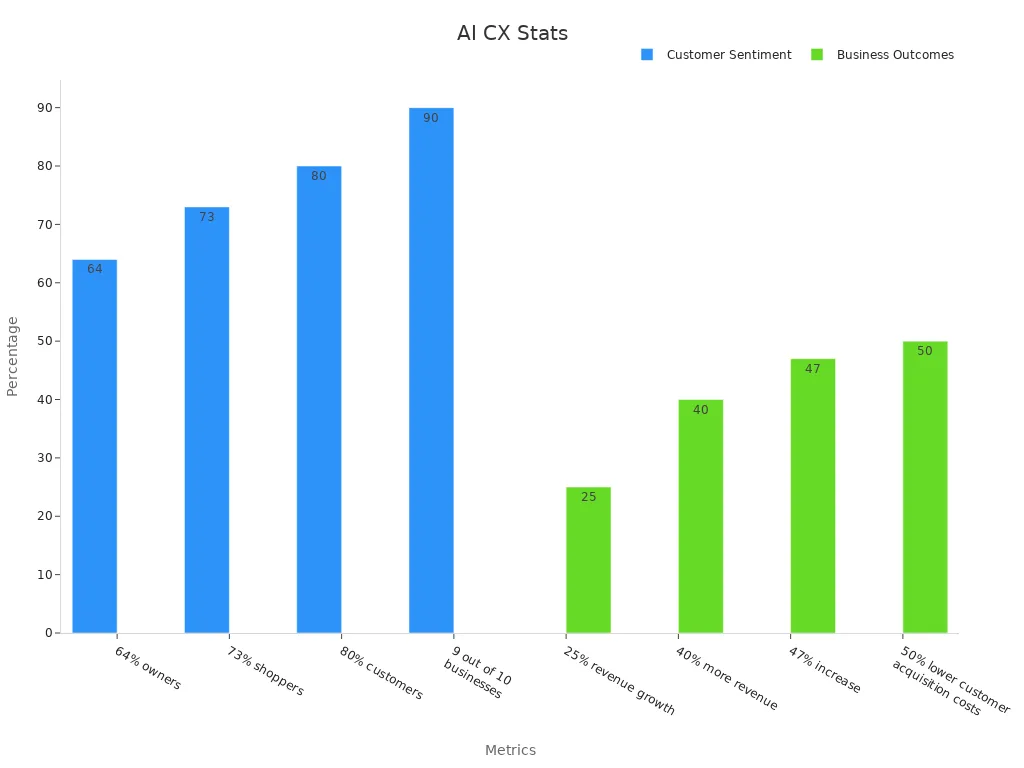
Tip: Start small with AI implementation, measure results, and scale gradually to achieve sustainable growth.
FAQ
What is the first step to implementing AI in customer experience?
Start by identifying your customers' pain points. Analyze feedback and interaction data to understand their needs. Use this information to choose AI tools that align with your goals. For example, Sobot’s AI Chatbot can address repetitive queries, improving efficiency and satisfaction.
How can AI improve customer satisfaction?
AI enhances satisfaction by providing faster responses, personalized recommendations, and 24/7 support. Tools like Sobot’s Chatbot handle routine queries autonomously, allowing human agents to focus on complex issues. This approach ensures customers receive timely and relevant solutions, boosting their overall experience.
Do AI tools require technical expertise to set up?
Not always. Many AI tools, including Sobot’s Chatbot, offer user-friendly interfaces that require no coding. You can design workflows using point-and-click features. This makes AI accessible for businesses of all sizes, even without technical expertise.
How does AI ensure data privacy in customer interactions?
AI systems use encryption and comply with regulations like GDPR to protect customer data. For example, Sobot’s AI solutions prioritize secure data handling with features like encrypted backups and compliance measures. Transparency about data usage builds trust with your customers.
Can AI replace human agents in customer service?
AI complements human agents rather than replacing them. It handles repetitive tasks, freeing agents to focus on complex or emotional issues. This collaboration improves efficiency and ensures a balanced approach, combining automation with the human touch for optimal customer experience.
See Also
Enhancing Efficiency With AI-Driven Customer Service Solutions
Navigating Artificial Intelligence Software For Call Centers
Evaluating AI Solutions For Enterprise Call Centers
